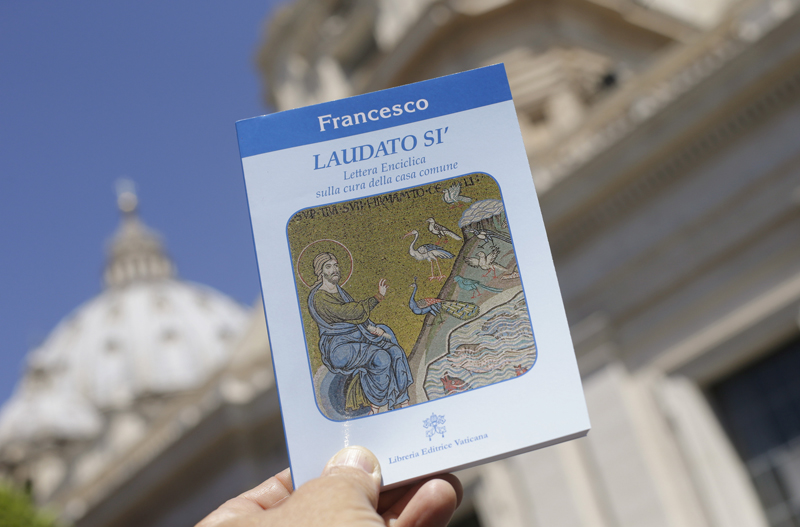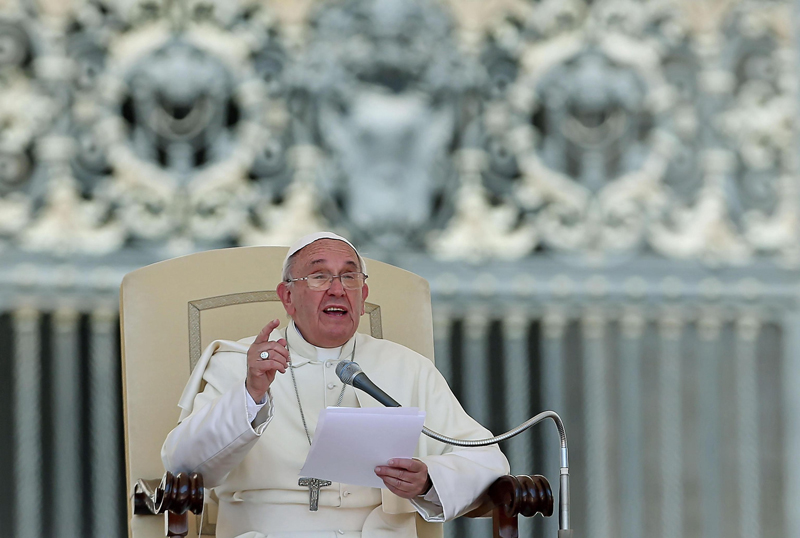
Pope Francis’ new encyclical, titled “Laudato Si’ (Praise Be): On the Care of Our Common Home,” is displayed during the presentation news conference at the Vatican on Thursday (June 18, 2015). The pope demands swift action to save the planet from environmental ruin, urging world leaders to hear “the cry of the earth and the cry of the poor,” plunging the Catholic Church into political controversy over climate change. In the first papal document dedicated to the environment, he calls for “decisive action, here and now,” to stop environmental degradation and global warming, squarely backing scientists who say it is mostly man-made. Photo courtesy of REUTERS/Max Rossi
*Editors: This photo may only be republished with RNS-ENCYCLICAL-FUTURE, originally transmitted on June 18, 2015.
(RNS) Pope Francis’ landmark document on protecting the environment and battling climate change is finally out after months of anticipation — and anxiety — that in the history of encyclicals is probably rivaled only by Pope Paul VI’s 1968 letter banning artificial birth control.
But will it have an effect?
Francis has made it clear that he wants this encyclical to help launch a new role for the Catholic Church in the fight against global warming, and he also knows it’s an uphill battle, both inside and outside the church’s walls.
Here are four challenges he faces in making his encyclical, “Laudato Si’,” or “Praise Be,” a game-changer, not a dead letter:
1. Mobilizing the international community
Francis has always been looking at the encyclical as a starting point, or perhaps a kick-start, for global climate talks that are ramping up again this year after a series of underwhelming meetings.
- The Third International Conference on Financing for Development will take place next month in Ethiopia.
- In September — when Francis will be in New York to address the world body — the U.N. General Assembly is to agree on a new set of Sustainable Development Goals running until 2030.
- In December comes the next Climate Change Conference, in Paris, when more than 190 nations will try to reach an agreement to limit greenhouse gas emissions.
“We expect the papal encyclical to have a major impact during a very critical year in this (climate negotiation) process,” the U.N.’s top climate official, Christiana Figueres, said earlier this month.
Francis hopes so too. In January, he said the previous Climate Change Conference, in Peru, “was nothing much, it disappointed me. I think there was a lack of courage.”
He told reporters that he wanted the encyclical out now so “that there is some time between the publication of the encyclical and the meeting in Paris” to help bolster the delegates to “be more courageous.”
But as Francis recognizes in the encyclical, real change will require a “bold cultural revolution” in mankind’s thinking. Can such a transformation happen?

Pope Francis speaks during his weekly audience in St. Peter’s Square at the Vatican on June 3, 2015. Photo by Alessandro Di Meo, courtesy of Catholic News Service
2. Converting political conservatives in the U.S.
The day before Francis addresses the U.N. in New York, he will become the first pope to address a joint meeting of Congress in Washington — a crowd that will remind him of the headwinds he faces in winning political support in the U.S.
Just this week, GOP presidential candidate Jeb Bush — a Catholic convert who touts his church bona fides as part of his platform — said in no uncertain terms that Francis was wrong on climate change and wrong to tackle the topic, and that “religion ought to be about making us better as people and less about things that end up getting in the political realm.”
Bush has plenty of company among his fellow Republicans and conservative Catholics, who have increasingly ratcheted up their criticisms of Francis, sometimes in personal and intemperate language.
It’s a stunning turn of events for conservatives who had been used to embracing the popes to support their agenda. But Francis seems undaunted. With this encyclical, the pontiff “is slapping his conservative critics in the face,” as the commentator Damian Thompson wrote in The Spectator.
But will that wake them up? Or just make them angrier?
3. Convincing the U.S. Catholic hierarchy
The U.S. Conference of Catholic Bishops is supposed to serve as the main delivery system and lobbying arm for papal teachings. But in the two years since his election, Francis has left many of the hierarchy’s American ranks — which have grown much more politically conservative in recent decades — as discombobulated, and at times disillusioned, as their counterparts in politics.
That could complicate Francis’ hopes of uniting the church in the U.S. to help influence the U.S. government to take the kind of bold action that the pope says is needed, as The New York Times reported earlier this month.
“When the encyclical comes out they’ll all get behind it, but they’re waiting to see what’s in it,” Cardinal Theodore McCarrick, retired archbishop of Washington, told The New York Times in an article detailing the problematic dynamics.
Real support could grow along with the wave of coverage, especially if the bishops see the public — critically, young people — resonating with the pontiff’s message.
Bishop Oscar Cantú of Las Cruces, N.M., a leader on international issues, said he wants the encyclical to be more than “Hints from Heloise” for Catholics, and a number of bishops around the country — led by Cardinal Donald Wuerl and USCCB president Archbishop Joseph Kurtz at a packed press conference in Washington on Thursday morning — began signaling the hierarchy’s long-term support.
4. Rallying American Catholics in the pews
As a Pew Research Center survey earlier this week showed, most self-identified Catholics (71 percent) say they “believe the Earth is warming,” a finding that tracks the public at large.
But there’s a 34-percentage-point gap between Catholic Democrats (85 percent agree) and Republicans (51 percent agree), with independents landing in between at 72 percent. Also, less than half of Catholics (47 percent) believe that warming “is caused by human activity,” as Francis says it is, and only 48 percent believe climate change “is a very serious problem.”
Can Francis move that needle?
“The poll doesn’t tell us if there’s a way the pope can cut through the politics,” Alan Cooperman, director of religion research for Pew, told Religion News Service. “Yet, it may be, as people hear about the encyclical, this could move, this could change.”
The Rev. Thomas Reese, an analyst of church trends at National Catholic Reporter, wrote Thursday that “revolution” is almost too weak a word for what Francis is calling for, and he acknowledges that it may well not come to pass, or at least not without great difficulty.
“We cannot expect the encyclical to miraculously change human attitudes and behavior overnight,” Reese writes. “Rather, the encyclical is the beginning of a process that will go on for years. It requires that each of us get involved for the long haul. This is a marathon, not a sprint.”
Also, Catholics quickly found they could safely ignore Paul VI’s birth control encyclical, and they by and large continue to do so. But global warming will be tougher to overlook if it continues to reshape the Earth’s atmosphere, and that may make Francis look like a prophet as much as a pontiff.
YS/MG END GIBSON




